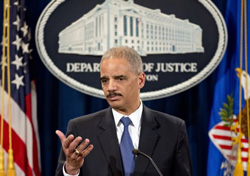Justice Department seized AP records to find ‘leaker’
Daily News Article — Posted on May 15, 2013
 (by Andy Soltis, New York Post) – In a move recalling the Nixon White House, the Obama administration secretly seized telephone records of lines assigned to The Associated Press (AP) in an apparent attempt to find out who leaked a report of a foiled al Qaeda plot on a US-bound airliner.
(by Andy Soltis, New York Post) – In a move recalling the Nixon White House, the Obama administration secretly seized telephone records of lines assigned to The Associated Press (AP) in an apparent attempt to find out who leaked a report of a foiled al Qaeda plot on a US-bound airliner.
Federal agents obtained records in April and May 2012 of outgoing calls for more than 20 work and personal phone numbers of AP journalists in New York, Washington and Hartford, the news agency said.
The AP said the Justice Department disclosed the effort on Friday. Yesterday, the news agency denounced the “massive and unprecedented intrusion.”
The Obama administration, which has aggressively moved to plug news leaks with Watergate-era zeal, was apparently upset by a May 7, 2012 AP report.
The exclusive story described how the CIA thwarted a new “underwear bomb” attack on a US-bound flight that was planned for the first anniversary of the May 2, 2011, raid that killed Osama bin Laden.
The AP report said a would-be suicide bomber was training in Yemen when the FBI seized the bomb, a sophisticated new weapon that did not contain metal and might have foiled airport scanners.
Although the story said the plot was undone well before it could be carried out, its disclosure embarrassed the secrecy-conscious Obama administration.
Officials had claimed there was no al Qaeda plot linked to the bin Laden anniversary – and they wanted to be the first to reveal that one had been foiled, AP said.
The administration was so upset about the leak that even CIA Director John Brennan was questioned about whether he was the AP’s source.
The case was unusual because of the volume of material sought by the feds and by their secrecy.
Six AP journalists who worked on the al Qaeda story were among those whose phone records were seized. But more than 100 journalists work in the offices where the telephone records were targeted, on a wide array of stories.
In a letter to Attorney General Eric Holder yesterday, AP President and CEO Gary Pruitt said the administration obtained information far beyond anything that could be justified by any specific investigation.
Also, when the government seeks phone records of a news organization, it typically notifies the target in advance and begins negotiations with it.
But this case was an exception, the government said in a letter to the AP. It cited an exemption to those rules that holds that prior notification can be waived if such notice, in the exemption’s wording, might “pose a substantial threat to the integrity of the investigation.”
Background
MORE ON THIS STORY FROM THE ASSOCIATED PRESS:
The Obama administration has aggressively investigated disclosures of classified information to the media and has brought six cases against people suspected of providing classified information, more than under all previous presidents combined.
The White House on Monday said that other than press reports it had no knowledge of Justice Department attempts to seek AP phone records. "We are not involved in decisions made in connection with criminal investigations, as those matters are handled independently by the Justice Department," spokesman Jay Carney said.
Justice Department rules require that subpoenas of records of news organizations must be personally approved by the attorney general, but it was not known if that happened in this case. The letter notifying AP that its phone records had been obtained through subpoenas was sent Friday by Ronald Machen, the U.S. attorney in Washington.
William Miller, a spokesman for Machen, said Monday that in general the U.S. attorney follows "all applicable laws, federal regulations and Department of Justice policies when issuing subpoenas for phone records of media organizations." But he would not address questions about the specifics of the AP records. "We do not comment on ongoing criminal investigations," Miller said in an email.
The Justice Department lays out strict rules for efforts to get phone records from news organizations. A subpoena can be considered only after "all reasonable attempts" have been made to get the same information from other sources, the rules say. It was unclear what other steps, in total, the Justice Department might have taken to get information in the case.
A subpoena to the media must be "as narrowly drawn as possible" and "should be directed at relevant information regarding a limited subject matter and should cover a reasonably limited time period," according to the rules.
The reason for these constraints, the department says, is to avoid actions that "might impair the news gathering function" because the government recognizes that "freedom of the press can be no broader than the freedom of reporters to investigate and report the news."
News organizations normally are notified in advance that the government wants phone records and then they enter into negotiations over the desired information. In this case, however, the government, in its letter to the AP, cited an exemption to those rules that holds that prior notification can be waived if such notice, in the exemption's wording, might "pose a substantial threat to the integrity of the investigation."
It is unknown whether a judge or a grand jury signed off on the subpoenas.
Arnie Robbins, executive director of the American Society of News Editors, said, "On the face of it, this is really a disturbing affront to a free press. It's also troubling because it is consistent with perhaps the most aggressive administration ever against reporters doing their jobs - providing information that citizens need to know about our government."
The May 7, 2012, AP story that disclosed details of the CIA operation in Yemen to stop an airliner bomb plot occurred around the one-year anniversary of the May 2, 2011, killing of Osama bin Laden.
The plot was significant both because of its seriousness and also because the White House previously had told the public it had "no credible information that terrorist organizations, including al-Qaida, are plotting attacks in the U.S. to coincide with the (May 2) anniversary of bin Laden's death."
The AP delayed reporting the story at the request of government officials who said it would jeopardize national security. Once officials said those concerns were allayed, the AP disclosed the plot, though the Obama administration continued to request that the story be held until the administration could make an official announcement.
The May 7 story was written by reporters Matt Apuzzo and Adam Goldman with contributions from reporters Kimberly Dozier, Eileen Sullivan and Alan Fram. They and their editor, Ted Bridis, were among the journalists whose April-May 2012 phone records were seized by the government. (from an Associated Press report posted at myway.com)

